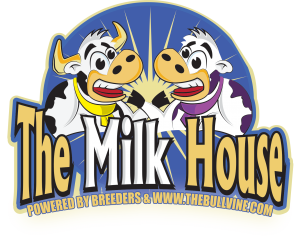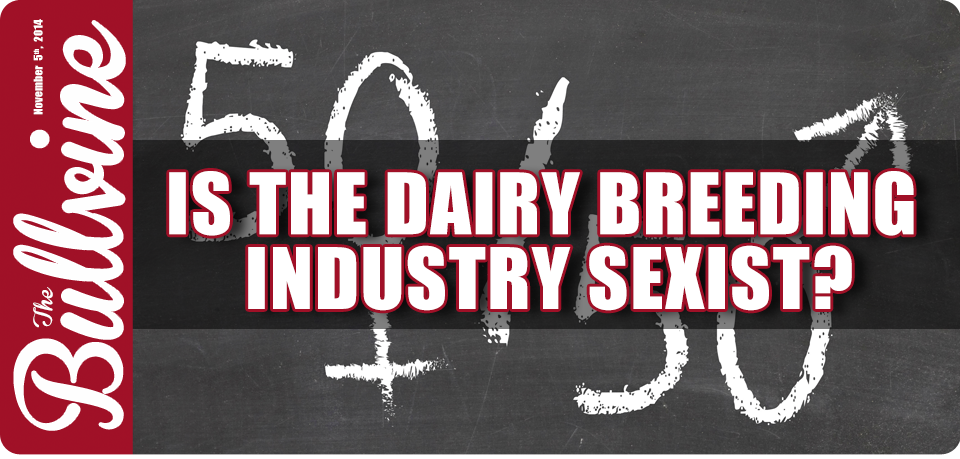The dairy industry is full of stereotypes. Some are false and some are well-earned. One stereotype that distinctly stands out is the gender inequality in the dairy industry. Look at the top of any of the dairy breeding companies and, outside of human resources and marketing, how many women are in C-Level or even senior leadership positions? One maybe two. This has me asking, “Is the dairy breeding industry sexist?”
While most of the world started going through a feminist movement in the 1960’s and ‘70s, parts of the dairy industry seem to have missed it entirely. Women are treated as inferior in many dairy breeding organizations with glass ceilings on their career growth and income levels. Ninety nine percent of the time executives and managers in the dairy breeding business and industry are men. While the dairy breeding industry has jumped headlong into new technology such as genomics, it is still light years behind when it comes to gender equality.
As a child, I grew up on your typical multi-generational dairy farm. With that the roles were well established. My grandfather and the men worked in the barns and the fields and my grandmother worked in the gardens and tended to the house. Except when it was harvest time. Then she did the milking and came in and put meals on the table for the hungry crews. She was more than capable of the chores when the “men” where in meetings and holding important dairy positions. Then my father, the only son, married a very independent and strong minded wife, who wanted to have her own career off the farm. It was like the world had come to an end!
For some families, differences in the roles of a wife and mother can be overlooked by the fact that you don’t see the comparison every day. But in our circumstance that was not possible, as we lived next door to my grandparents. Who actually did what job was very obvious. While grandpa was responsible for the cows and the cropping, and grandma was responsible for the children, house and gardens. Although as every farm family knows, grandma had to help out wherever needed, often working side by side with grandpa in the barn and in the fields. Who got credit was less obvious. My grandmother was justifiably proud of claiming (and getting) joint recognition for the Master Breeder achievement in 1984.
After 18 years of working for Holstein Canada running the type classification and genetic improvement department, my father had decided to move onto a new challenge and joined the Canadian Association of Animal Breeders (CAAB), and ultimately become the General Manager there. In looking to grow CAAB there was a need for a new marketing executive, and the then General Manager, Rusty MacDonald, hired my mother as the Information Director. Now, having two parents that work at the same place isn’t that unusual for many Bullvine readers since most dairy farms are family run. So you can relate to the fact that work does not stop outside the house. It is the conversation at the dinner table, on the way to church on Sunday and, heck, pretty much all the time. One of the things that became very clear to me as a child was the glass ceiling that had been established in the dairy breeding industry. We often heard heated discussions about how hard it was for my mother to get the respect she deserved for her ideas and efforts in the dairy breeding industry. My father, who was extremely supportive of my mother, could not change the ways of senior leaders in other dairy breeding organizations.
 Not much has changed since the days that my parents both worked for CAAB. In doing a quick analysis of the current leadership teams at the major artificial insemination organizations as well as milk recording and breed associations, I find very few female senior leaders. While yes there are some in the colored breeds as well as the General Manager at Holstein Canada, and a few positions on the senior leadership team at Holstein USA, I have found it hard to find many females at the top. I posed this question on the Milk House (Read more: Introducing The Milk House – Dairy Breeder Networking on Facebook) and was only able to find two females – one at Accelerated and one at Genex in senior leadership roles that are not human resources or marketing related.
Not much has changed since the days that my parents both worked for CAAB. In doing a quick analysis of the current leadership teams at the major artificial insemination organizations as well as milk recording and breed associations, I find very few female senior leaders. While yes there are some in the colored breeds as well as the General Manager at Holstein Canada, and a few positions on the senior leadership team at Holstein USA, I have found it hard to find many females at the top. I posed this question on the Milk House (Read more: Introducing The Milk House – Dairy Breeder Networking on Facebook) and was only able to find two females – one at Accelerated and one at Genex in senior leadership roles that are not human resources or marketing related.
Growing up, my sister was as talented as my brother or myself. She was equally as capable as a judge, as well as talented in business. My brother has worked for one AI company for 20 years and is now the Chief Operating Officer. However my sister has had to deal with many more barriers and challenges in the past in order to achieve her success. My parents taught us all never to back down when you believe in something. While that has served us all well, it also created many challenges for sister. Especially when working with males who believe in male entitlement. When you look at things relative to the obstacles faced, there is no question that my sister has achieved as much, or more, than either of us boys. And yet, if you look at it in terms of fame and recognition, she has not had equal opportunity.
![579040_295105643933648_1149328203_n[1]](https://www.thebullvine.com/wp-content/uploads/2014/11/579040_295105643933648_1149328203_n1.jpg)
An interesting point that was raised in the discussion on the Milk House was about the many talented young woman that have been doing extremely well in the dairy judging competitions. However, this is not new. The challenge is that these young woman have not seen their abilities work as a stepping stones to senior leadership roles in our industry as they do for males. How many of these ladies have gone on to judge the Holstein Show at World Dairy Expo or The Royal? None. There are certainly many talented women, such as Kelli Cull from Budjon and Molly Sloan, who have the talent to do so, and I think should be given the opportunity. This has been the circumstance for over 30 years. I can remember when I was younger, over 20 years ago, I had the opportunity to be judged by the likes of Kenda Nurse, and Nancy Hazeleger, two woman that did an outstanding job, not just because they made me champion, but because they had placings you could easily follow, gave good sound reasons and interacted very well with the exhibitors. All trademarks of a good judge.
Bullvine Bottom line
As we have found many times here at The Bullvine, numbers don’t lie. The fact that there are so few woman in senior leadership roles and that we have never had a female judge at a major North American Holstein Show (Royal or Expo) speaks volumes. The same is true on the farm. While there is no question that most women are full partners and 50% (or more) of the brains behind the operation, how many times do you see them in the limelight or getting the recognition? Women are not only suitable for cooking, gardening or secretarial work but they are equally as capable as men in all aspects of dairying. We as an industry need to recognize that.

Get original “Bullvine” content sent straight to your email inbox for free.
















Leave a Reply
You must be logged in to post a comment.